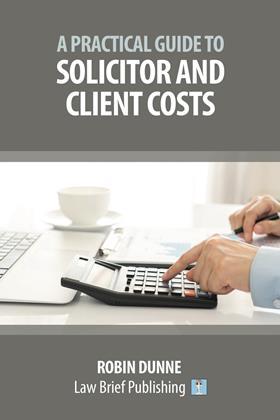A Practical Guide to Solicitor and Client Costs
Robin Dunne
£29.99, Law Brief Publishing
★★★✩✩
You are telephoned by a new client who wants a will. You visit them on the way home and tell them it will be about £150. You prepare the will and send it off with a bill for £200 as it was a bit more complicated than you expected. The letter but not the bill is signed by a caseworker. The bill simply says ‘as to legal advice’.
You see a sign saying ‘MOTs from £50’ and leave your car there. They tell you they will phone if anything is wrong. When you collect your car from the garage having heard nothing from them, you are presented with a bill for £500.
Solicitors work in one of the most regulated professions when it comes to charging for work. The above scenario should flag up various issues about agreements made at clients’ homes; whether bills should be signed and if so by whom; how much detail to put in about what work was done; and when to give an estimate. If you do not know the answers to those points, you need this book which is written by an expert and covers all those areas well.

Not only are we heavily regulated, the rules about costs are complicated, and case law is not always clear. Clarity is the golden rule but that is not always easy at the beginning of a piece of work that may have unforeseen pitfalls and complications owing to the vagaries of the courts system or the behaviour of other parties. Having said that, this book includes a very good specimen estimate and some helpful guidance on the difference between estimates and fixed-price quotations.
Revising an initial inadequate estimate is not always sufficient. If the client starts a case based on a totally inadequate estimate, the solicitor will be lucky to get much even if the estimate is subsequently replaced by a reasonable estimate.
There is a section on the requirement for statute bills before attempting to recover costs from a client; there is discussion too about the rules and about who can sign the bill. It does not need to be a partner, so long as the person signing it is authorised. Believe it or not, someone defended a claim for costs because the bill had been signed using an abbreviation of the firm’s name.
The courts seem to be hard on us when it comes to costs. You cannot blame judges who have insisted that the client should have enough information to know whether they are being overcharged. Maybe we have ourselves to blame; we need to be clear and get things right first time. We would probably all benefit from knowing more about this area.
David Pickup is a partner at Pickup & Scott Solicitors, Aylesbury
- Would you be interested in writing a book review for the Law Society Gazette? The Gazette receives books on a range of legal specialisms, as well as fiction, history and biography. If you are interested please write to Nicholas Goodman indicating your specialism.
































No comments yet